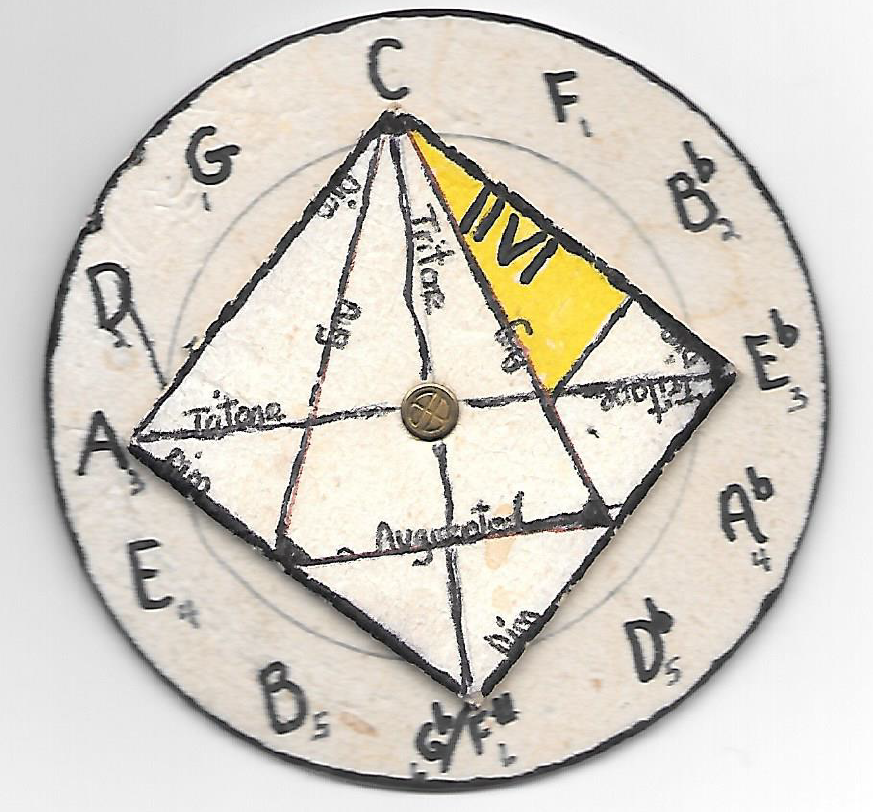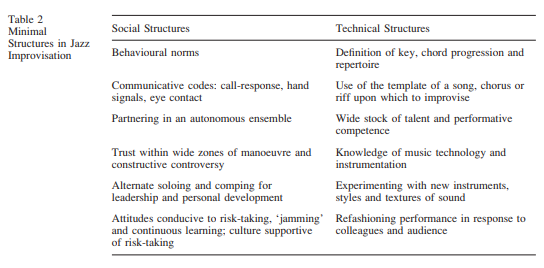How Does The Theory You've Learned Apply To Improvising?
-
We've heard that we must learn the theory and then forget it when we improvise. I suggest that the vast majority of people bring to the stage what they've learned.
As for me, I've learned the importance of the tritone substitution, time and space, Whole tone scales, the importance of knowing the chords (major, Dom7, Minor, half diminished, diminished), and their inversions. -
This is an ESSENTIAL read to truly appreciate the mechanism behind jazz improvisation. It incorporates jazz improve for business leaders to better connect with clients, but it also has important history and structural requirements to be successful at improvisation. This article was a game changer for me:
https://pdfs.semanticscholar.org/6494/64c46bab1840d40402f8a2eac476df1505c9.pdf
-
@Dr-Mark said in How Does The Theory You've Learned Apply To Improvising?:
As for me, I've learned the importance of the tritone substitution, time and space, Whole tone scales, the importance of knowing the chords (major, Dom7, Minor, half diminished, diminished), and their inversions.
And then there is the ingenious invention that helps you visualize the process:

PERSONALLY, I FIND THIS WHEEL PRODUCED ON BEER COASTERS A REAL PLUS!
-
The Developmental Structures required to optimize Jazz Improvisation (From the Article Above)

-
30+ pages? I don't think so.
How does theory relate to "playing by ear"? For me, the theory give me a structure to build on and alternate tonal options. Depending on what stage someone is, I recommend playin using your intuition until you really get hung up and then stop and clarify with theory analysis. First the ear and then the brain, not the reverse.
I use heory to clarify how a tune is organized, where the climaxes are and how to get to, and away, from them. Also, superimposing alternate tonalities over the obvious.
One word about forgetting what you've learned. I think this is metaphoric. One doesn't so much forget what one's learned as much as learned it so well, one has internalized the material so that it comes by second nature.
A great study on this subject is Paul Berliner's detailed opus, "Improvising Jazz".
-
Different types of people process things in different ways, I dare say. Some are more feel, ear, sense of the music, while others want to break it all down painstakingly by way of a formula. Nothing wrong in either case, it’s just what makes us all different.
For me, once I feel something, it sticks. Often I need to hear it first, but just once will do it, usually. Not that I am a jazz improvisor to that extent, but with certain music that leans more towards a jazz feel I go that way. -
@Kehaulani said in How Does The Theory You've Learned Apply To Improvising?:
30+ pages? I don't think so.
Please read it before you critique. The article shows what is needed to optimize improvisation. If you do not want to advance your improvisation skills it's your choice to just be proficient. -
Hi Dr-GO,
I read the article and yes, I feel they are on the mark, especially when they talked about the need to innovate during the NASA Apollo XIII rescue because it was unknown territory and a new type of worker was needed. -
@Dr-GO said in How Does The Theory You've Learned Apply To Improvising?:
@Kehaulani said in How Does The Theory You've Learned Apply To Improvising?:
Not sure the above isn't a bit garbled, but if the question is how has the theory I've learned applied to improvising?, I probably run through a tune a few times to get the feel of it, then maybe d a little analysis; find out where the cadences are, then revisit the harmonic structure, not just to learn the tune, but to explore alternate scales and harmonies, too.
-
@Dr-GO said in How Does The Theory You've Learned Apply To Improvising?:
@Kehaulani said in How Does The Theory You've Learned Apply To Improvising?:
Please read it before you critique. The article shows what is needed to optimize improvisation. If you do not want to advance your improvisation skills it's your choice to just be proficient.
I did not critique it, I meant that I don't want to put in the time right now in reading it. And I don't believe that not reading it implies that I'm stale. That would be rather hard to know, n'est-ce pas?
-
@Dr-Mark
@Dr-Mark said in How Does The Theory You've Learned Apply To Improvising?:
We've heard that we must learn the theory and then forget it when we improvise.
We're speaking metaphorically, of course. I don't think you "forget it". Instead, I think it becomes second nature.
For example, when I play a C scale, I'm not thinking about the fingerings. But of course, I haven't forgotten the fingerings, either. It become second nature. (Of course, we can argue over what "second nature" means, too.
 )
)And FWIW, theory/grammar is fundamental to any language. For example, we don't speak words "by ear" or "by intuition". If we did, it would just be meaningless noise. And while there are some illiterate people who have a reasonable command of the spoken language, these are exceptions.
The same is true with improvisation. Of course, there are exceptions. And a BigDub said, different types of people process things in different ways. But most people who think they can just play what sounds good (without understand the meaning of what they are playing) are likely working with a significant handicap. This approach might work within a constrained context, but quickly falls apart as you try get more advanced.
Mike
-
@Kehaulani said in How Does The Theory You've Learned Apply To Improvising?:
I did not critique it, I meant that I don't want to put in the time right now in reading it.
Got it. Kehaulani, the meat is page 143 to 149. Read those 6 pages and do let me know what you think. Your input is much appreciated.
-
@Kehaulani said in How Does The Theory You've Learned Apply To Improvising?:
And I don't believe that not reading it implies that I'm stale.In my statement I used the term proficient:
proficient.
[prəˈfiSHənt]ADJECTIVE
1.competent or skilled in doing or using something.synonyms:
skilled · skillful · expert · accomplished · experienced · practiced · trained ·
[more]So proficient does not equal stale. You and I both know you are better than this.
-
EVERYONE READ THE ARTICLE, PAGES 143-149.
This discussion is going toward proficiency. I need to do that. You need to do this. This will get you to proficient. My attempt is to get people reading this thread to go BEYOND proficient. The reading talks about proficiency, yes. But it goes much beyond. It gives insight as to how to WORK WITH THE ENSEMBLE. That is the POWER of improvisation. Improvisation is ALL ABOUT communication. The communication is with the ensemble , and with the audience. That is the next level. This article gives you how to structure technical and SOCIAL skills on how to channel rapidly incoming sounds and progressions and how to use the talent of the ensemble and audience to turn the sounds into a performance that is appreciated by all. That is the goal of jazz improvisation. Making it real for the performer is only have the goal. Read pages 143-149, they are vital to truly understanding the art of improvisation. -
@Dr-Mark said in How Does The Theory You've Learned Apply To Improvising?:
Hi Dr-GO,
I read the article and yes, I feel they are on the mark, especially when they talked about the need to innovate during the NASA Apollo XIII rescue because it was unknown territory and a new type of worker was needed.Dr-Mark, you are partially quoting from the "Sequential Model", where the reference to NASA was made. The actual reference was: "These studies found that the logical, sequential flow resulted in financial success. While initially developed by NASA in the 1960s, the model was later diffused to firms such as 3M, HP, IBM and Exxon, and many others over theyears." No reference to the Apollo XII rescue. What in the hell are you smoking! Can I get some from you when I am in Orlando?
If this is your take away, then you missed reading the section on jazz improvisation (JI). Please read that section, Page 143-149, and perhaps while drinking a Bombay Sapphire Gin and Tonic. Much more pleasing to the palette and mind.
-
I find that theory study makes the most sense when you immediately play what you have just learned. Analysis of improv solos is also helpful to understand the relationship of the theory behind what you hear, especially if you transcribe and analyze your own solos. One of my college teachers had me do a lot of that, and it really helps me to understand what I want to play and make what I hear in my head become reality.
-
@tmd said in How Does The Theory You've Learned Apply To Improvising?:
We're speaking metaphorically, of course. I don't think you "forget it". Instead, I think it becomes second nature.
Hi tmd,
When Miles Davis made this statement (I'm paraphrasing), I think he was heading in another direction. My understanding of that statement was directed at the (for example) the senior performance level student.
How many times have you performed or jammed with someone who plays their improve by going through various exercises and once they are through, they've said nothing but they sure did play page 125 from the Arbans book perfectly or played someone else's improve (Ex Coltrane's Giant Steps solo). I've played with a slew of people (usually in or fresh out of college) that play a lot of notes but say very little.
Of course I've played with some college kids that will make the hair on your neck stand up because they were so good. But I think the statement was for the ones that bring their exercises and memorized solos to the bandstand. -
@flugelgirl said in How Does The Theory You've Learned Apply To Improvising?:
I find that theory study makes the most sense when you immediately play what you have just learned.
Hi Flugelgirl,
The key word to that statement is "learned". I've worked on stuff and pushed the correct valves but couldn't hear (understand) what I was doing. In short, I couldn't hear it and if I can't hear it, I can't have it. A good example was when I was first introduced to the whole tone scale and its applications to improvisation. I even dissected it and learned that all I need to do is play (for example ) the first three notes of the C major scale followed by the first three notes of the F# major scale. I'd play the damned thing over and over playing it correctly but just not getting it. However, once I drilled the sound into my head and heard how other musicians used it, then the fun began. -
@Dr-Mark I never really had that disconnect when the horn was in my hands - always happened when I sat in a classroom taking notes without it. When teaching Jazz theory to students, I’ve found that it helps them understand if you say “Here’s a chord, now arpegiate it. Play the scales associated with it, see why they work.” It also helps to show them the patters, but make them make up their own improv from the patterns. Helps get rid of that “play your exercises on the bandstand” thing when you promote creativity in lessons.
-
An aside ref. the Whole Tone scale, for some reason, unless it's an integral part of a clearly recognizable song, I avoid it. Don't know why, it just sounds so cliché to me.